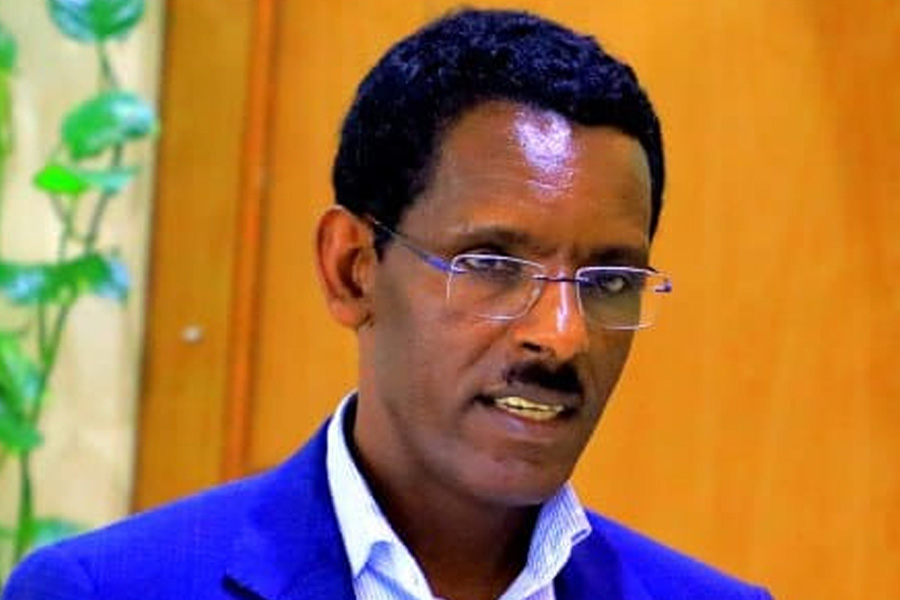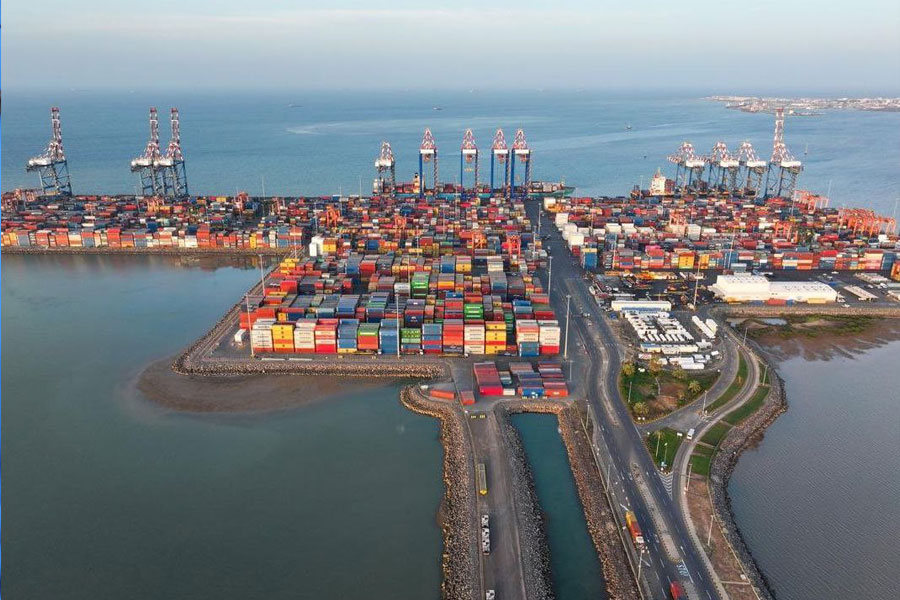
Nov 25 , 2023
By BERSABEH GEBRE ( FORTUNE STAFF WRITER )
A new regulatory measure Djibouti's customs officials enforced led to importers being confronted with weeks-long delays and incurring significant demurrage costs.
Djibouti customs officials have begun strictly enforcing measures that restrict the transit of shipments with Freight on Board (FOB) invoices valued at less than 25,000 dollars. The new policy has led to a standoff, with containers falling below this invoice threshold facing difficulties in gaining clearance. Ethiopian businesses incur substantial demurrage fees and port rental costs, adding to their financial burdens in an already trying economic environment.
This has prompted an immediate response from the Ethiopian Customs Commission (ECC). Commissioner Debele Kebeta appealed to the Djibouti Customs & Indirect Office, urging the facilitation of streamlined clearance procedures. Discussions from the joint commission meeting of the customs offices of both countries were held in March last year, which addressed 18 agendas.
Commissioner Debele's letter on November 10 cited Ethiopia's customs laws Parliament passed in 2014, highlighting a self-assessment system permitting exporters and importers to declare the value of goods and pay duties based on their submissions. The Ethiopian customs offices would then verify the invoice value post-transit, a process designed to expedite cargo movements. However, Debele believes the new requirement by Djibouti officials for actual price invoices brought a significant limitation.
He argued the new requirement impedes the free movement of transit cargo, leading to unnecessary delays, additional costs, and severe shortages of inputs for local manufacturers.
The Commission's Communications Director, Zerihun Assefa, revealed to Fortune that ongoing discussions between the two countries aimed at addressing the challenge of under-invoicing were taking place. He disclosed that immediate relief measures are being coordinated for shipments presently stalled at ports in Djibouti.
"We're coordinating on transiting certain shipments," he told Fortune.
A landlocked country since Eritrea's independence in the 1990s, Ethiopia finds itself in a logistical quandary with 95pc of its imports and exports traversing through ports in Djibouti. The reliance, born out of necessity, has intensified as diplomatic frictions with Eritrea shuttered access to the ports of Assab and Massawa.
In recent years, Ethiopia and Djibouti have inaugurated an infrastructure feat. An 80Km road linking Tadjoura, a port city, with northeastern parts of Ethiopia, the 159 million dollar project, fully funded by the Kuwait Fund for Arab Economic Development, signals a deepening of trade ties. Yet, Tadjoura Port, which had remained underutilised by Ethiopia, might soon see a shift. The Ethiopian Shipping & Logistics Services Enterprise (ESLSE) has hinted at a potential shift to this route, provided the port meets its cargo transport standards.
The ESLSE, with a fleet of 15 ships, including two oil carriers, has cemented agreements with Berbera Port's officials. Ethiopia's cargo throughput was around 10,000 containers monthly, with a daily procession of 550-600 trucks ferrying goods from Djibouti to Ethiopia.
Ethiopia's quest for alternative routes to the sea is not new. It used Port Sudan beginning in 2015 and has plans to utilise the Port of Berbera, committing five percent to 10pc of its imports through this route. However, Djibouti's ports remain the linchpin in Ethiopia's external trade.
Djiboutians are aware of their role in Ethiopia's expanding economy. They have embarked on a 9.8 billion dollar expansion of their port assets and transport infrastructure.
President Elisabeth Getahun, through her 90-strong Ethiopian Freight Forwarders & Shipping Agents Association (EFFSAA), appealed to officials of the Ethiopian Maritime Authority (EMA) and ECC, about the confusion and regulatory uncertainty her members faced due to these new stipulations at Djibouti ports.
"Serious bilateral discussions for a permanent solution are critical," she said, reflecting the situation's urgency.
She expressed deep concerns as forwarders, shipping agents, and importers found themselves in a regulatory limbo due to an ambiguous requirement, leading to severe delays in the delivery of goods as containers got held up.
"There is no even written law from the Djiboutian side," said Elisabeth in a perplexed tone.
The impact of the unfolding regulatory fiasco changes extends beyond commercial goods. The Ethiopian Diabetics Association (EDA), a 38-year-old healthcare organisation with 76 branches, is caught in the regulatory debacle. With over 80,000 members, its leaders blamed the new regulations for delays in receiving medical equipment and medicine from the World Diabetic Association (WDA) and other donors.
Ermias G. Mariam, the communication director of the EDA, was worried about the shelf life of the medications held up at the ports. Despite clarifications that the low-invoiced medical shipments were donations, Djibouti officials have failed to process their clearance in time.
Despite a longstanding port utilisation protocol between Ethiopia and Djibouti dating back to 2002, even minor changes in implementation have historically led to significant disruptions in Ethiopia's trade activities. This was recently echoed by an association of 21 companies from Hawassa Industrial Park, which filed a complaint against the demurrage fees resulting from these regulatory changes.
Hibret Lema, head of the investors association in the industrial park, was vocal about the difficulty of 27 containers from members that had accumulated at the ports. He noted that clearance difficulties at Djibouti port have been persistent, exacerbated by the recent regulatory changes.
"They're inconsistent in their regulations," he told Fortune.
This has further strained Ethiopian investors, who are already struggling with declining demand following Ethiopia's suspension from the Africa Growth Opportunity Act (AGOA). Delays in clearance procedures could lead to further losses, as buyers become increasingly wary of timely deliveries.
"Companies can't afford to lose buyers due to delays," he underscored.
Observers of Ethiopia's logistics landscape call for a comprehensive overhaul of the bilateral arrangements with Djibouti.
Matiwos Ensermu (PhD), a logistics and supply chain management lecturer at Addis Abeba University, insisted on updating the two-decade-old agreement. He urged timely diplomatic efforts to avert confusion and streamline transit procedures. Matiwos also advocated expanding port options to diversify Ethiopia's trade routes and reduce dependence on a single port. Such reliance was mentioned by Prime Minister Abiy Ahmed (PhD), who recently warned of the critical need for sea access and alternative ports to prevent a potential crisis.
"Expanding port options is also crucial," he told Fortune.
Yalew Tesfaye, head of EMA's logistics administration, reflected similar concerns. He disclosed that the Ministry of Transport & Logistics had tasked the Maritime Authority to negotiate additional port access to relieve pressure on the Djibouti corridor.
PUBLISHED ON
Nov 25,2023 [ VOL
24 , NO
1230]

Fortune News | Nov 10,2024

Radar | Dec 01,2024

Fortune News | Dec 04,2021

Fortune News | Apr 20,2019

Fortune News | Jun 11,2024

Dec 22 , 2024 . By TIZITA SHEWAFERAW
Charged with transforming colossal state-owned enterprises into modern and competitiv...

Aug 18 , 2024 . By AKSAH ITALO
Although predictable Yonas Zerihun's job in the ride-hailing service is not immune to...

Jul 28 , 2024 . By TIZITA SHEWAFERAW
Unhabitual, perhaps too many, Samuel Gebreyohannes, 38, used to occasionally enjoy a couple of beers at breakfast. However, he recently swit...

Jul 13 , 2024 . By AKSAH ITALO
Investors who rely on tractors, trucks, and field vehicles for commuting, transporting commodities, and f...

Jun 28 , 2025
Meseret Damtie, the assertive auditor general, has never been shy about naming names...

Jun 21 , 2025
A well-worn adage says, “Budget is not destiny, but it is direction.” Examining t...

Jun 14 , 2025
Yet again, the Horn of Africa is bracing for trouble. A region already frayed by wars...

Jun 7 , 2025
Few promises shine brighter in Addis Abeba than the pledge of a roof for every family...